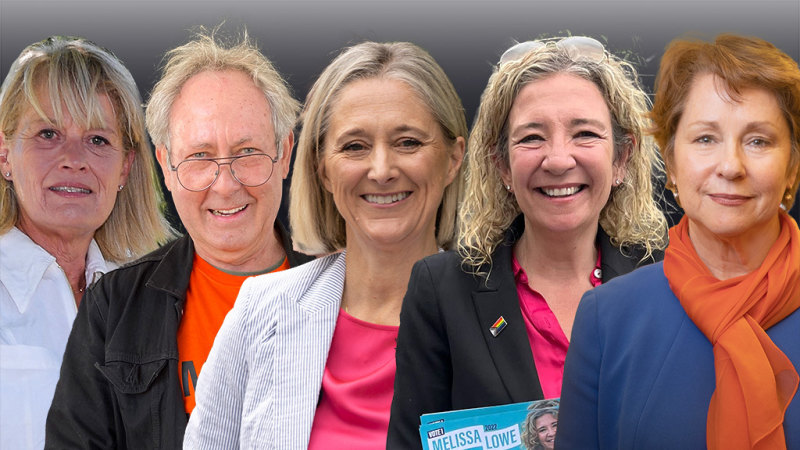Save articles for later
Add articles to your saved list and come back to them any time.
Ten independents wiped out at last year’s state election have argued they should be exempt from new donation rules that were designed to quash undue influence over politicians.
In a joint submission to the Victorian parliament’s inquiry into the election, the candidates said independents should be able to fundraise $250,000 free from donation caps because they say it handicaps challengers, while the major parties benefit from other sources of income.
Independent candidates Felicity Frederico, Ian Birchall, Sophie Torney, Melissa Lowe and Suzanna Sheed.
Under the proposal, the $4320 donation cap would only be enforced once an independent reached the $250,000 mark.
Despite the success of “teal independents” at last year’s federal election, which did not limit the size of donations, the number of independents in Victoria went backwards at the November state election. Suzanna Sheed lost the seat of Shepparton and Ali Cupper was overcome in Mildura, while independent candidates failed in Liberal heartland seats in Melbourne.
“What would [parliament] look like with a level playing field? It might look very different,” Hawthorn independent challenger Melissa Lowe said.
November was the first time Victoria’s sweeping new campaign rules – which limited donors to providing a maximum of $4320 over four years – were tested at an election. The donation cap applies to everyone but major parties still reap public funding and unlimited cash from nominated and associated entities.
“This limits the ability [of independents] to fundraise and compete financially with the major parties whose campaigns are predominately financed outside of the cap, allowing major party candidates to easily outspend independent challengers,” the joint submission said.
Former MPs Sheed and Cupper signed up to the joint submission, along with challengers Lowe, Brighton’s Felicity Frederico, Mornington’s Kate Lardner, Kew’s Sophie Torney, Jacqui Hawkins in Benambra, Ian Birchall in Melton, Nicole Seymour from Rowville and Carol Altmann in the South-West Coast electorate.
The new framework was designed to stop the undue influence donors can wield over politicians, which is not addressed in the proposal from the group.
Catherine Williams, from the Centre for Public Integrity, says donation caps without expenditure caps favour major parties and incumbents.
The Centre for Public Integrity believes election spending caps, similar to those in NSW, would do more to level the playing field but agreed the existing framework appeared to favour major parties and incumbents.
“It appears that donation caps without expenditure caps do favour major parties and incumbents,” Dr Catherine Williams, research director at the body said.
Federal Labor is considering electoral reform to cap political donations and spending allowed in each seat during a campaign following the recommendations of a parliamentary committee.
This would block figures such as mining magnate Clive Palmer from spending huge sums on electoral costs, having poured $117 million into the United Australia Party before the 2022 federal election.
Frederico said she couldn’t say whether the hurdles independents faced were to blame for losses at the state election, while Lowe said it was not the sole cause but must have contributed.
Candidates of all stripes complained about an unusually aggressive campaign, forcing the Victorian Electoral Commission to limit the number of volunteers allowed at polling booths in November.
Frederico said she found the campaign experience tough and the independents recommended a new code of conduct, with consequences for breaches, to operate during an election.
Benambra MP Bill Tilley made his own submission that accused his challenger, Hawkins, of breaking campaign rules by hanging too many decorations at a booth. Hawkins did not respond when contacted by The Age on Thursday.
Political parties can hang up to six signs at a polling place (two for the lower house candidate, two for a corresponding upper house candidate and two promoting the party).
Independents can only display two under the current regime, which the joint submission argued also required reform.
Like the independents, Tilley described the election as “one of the most bitter, divided and antagonistic campaigns of my 16 years in politics”.
The Morning Edition newsletter is our guide to the day’s most important and interesting stories, analysis and insights. Sign up here.
Most Viewed in Politics
From our partners
Source: Read Full Article


